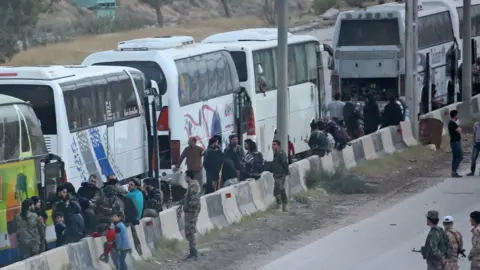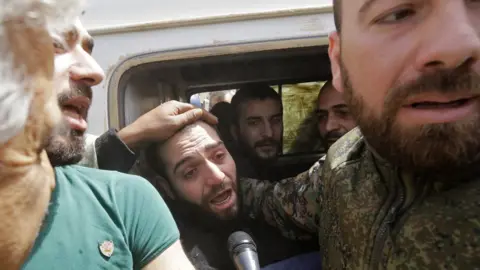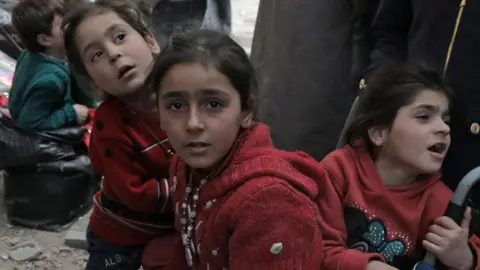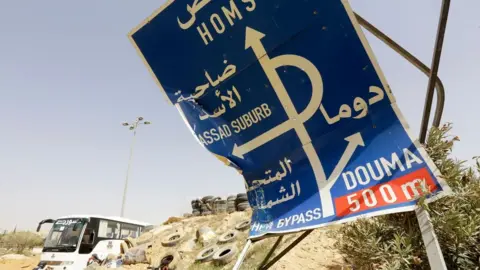Syria war: First rebels leave defeated Eastern Ghouta town
 AFP
AFPSyrian rebels and their families are being evacuated from a key town in the besieged Eastern Ghouta region as part of an agreement with the government.
Buses carrying 1,480 people, including 600 Ahrar al-Sham rebels, drove out of Harasta as night fell, en route to the rebel-held northern province of Idlib.
A military source said hundreds more were expected to follow on Friday.
The evacuation deal is the first agreed since the offensive on the Eastern Ghouta was stepped up a month ago.
A monitoring group says the air and ground assault has killed 1,500 civilians, injured 5,300 others, and forced 82,000 to flee in recent days.
Government soldiers and allied militiamen have driven rebel forces out of about 70% of the region, cutting it into three pockets - one of them around Harasta.
How many people are leaving Harasta?
The opposition council said 20,000 civilians were trapped there last week.
It said air and artillery strikes by the government and its allies during their five-year siege of the Eastern Ghouta had deliberately targeted civilians in the town and destroyed its infrastructure, denying them access to food and medical treatment.
Despite the onslaught, a Syrian military source told Reuters news agency that more than 18,000 people were expected to stay in Harasta under government rule.

On Wednesday, state media reported that a total of 1,500 rebels and 6,000 civilians were expected to be evacuated under the deal with the government.
What has happened so far?
The implementation of the deal began on Thursday morning with a prisoner swap.
State TV reported that 18 people were freed, 13 of them held by the rebels. It interviewed a soldier among them, who thanked God and the army for his release.
 AFP
AFPLater, the Syrian Arab Red Crescent confirmed that its personnel had entered Harasta and it posted photos of them helping civilians on to buses.
There were conflicting reports about the evacuation's progress throughout the day.
State media said rebels and civilians were leaving Harasta on buses every hour, but a BBC Arabic correspondent outside Harasta said the convoy only departed at around 19:00 (17:00 GMT).
State TV broadcast pictures of the buses driving slowly down a road in darkness and announced that they were headed to Idlib.
Will other towns be evacuated?
Ahrar al-Sham fighters in Harasta agreed to lay down their weapons in return for safe passage to Idlib, home to more than 2.6 million people.
 AFP
AFPSpokesman Monther Fares told the Associated Press that they had faced "civilian pressure" as a result of the intense air strikes, which had forced people to live underground for three months.
The BBC's Martin Patience in Beirut says the deal may put pressure on the rebel groups that control other parts of the Eastern Ghouta to follow suit.
Similar deals have been on the table with Jaysh al-Islam - which controls the northern pocket around Douma - and Faylaq al-Rahman - which controls the southern pocket around Arbin and Zamalka - but have yet to get anywhere.
Both factions have vowed to keep fighting, even as they have been driven further and further back.
 AFP
AFPGovernment air strikes on the southern pocket killed at least 19 people on Thursday, according to the Syrian Observatory for Human Rights.
The UK-based monitoring group also said more than 4,000 civilians had fled Douma on foot and crossed into government territory through the al-Wafideen checkpoint over the past 24 hours. The civilians were leaving under an agreement between Jaysh al-Islam and Russia, it added.
Rockets and mortars are also still being fired by rebels into government-held districts of Damascus. A police source told Sana that four civilians were killed and 14 others injured by shells that hit the capital on Thursday.
Meanwhile, an air strike in Idlib itself reportedly killed 22 civilians. The Syrian Observatory said a market was hit in the town of Harem, which is controlled by the al-Qaeda-linked jihadist alliance, Hayat Tahrir al-Sham.
